
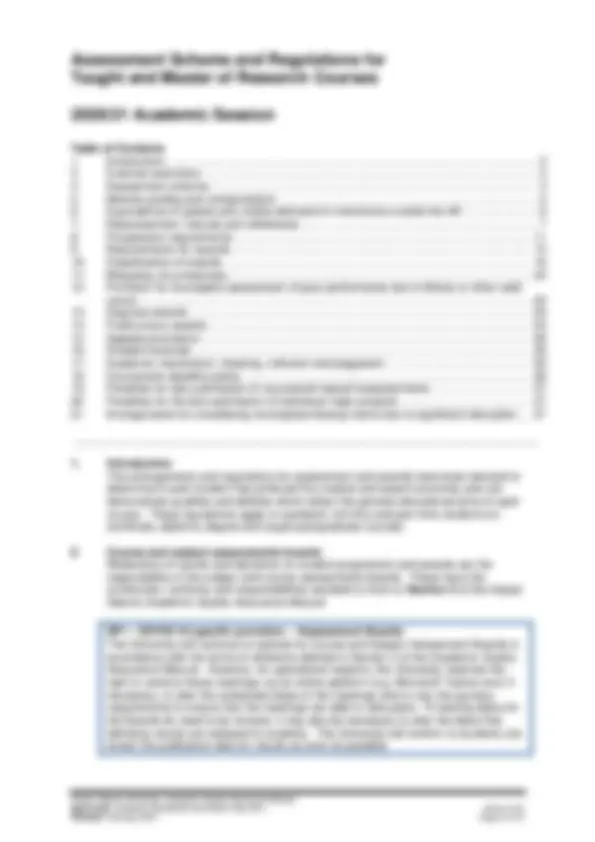
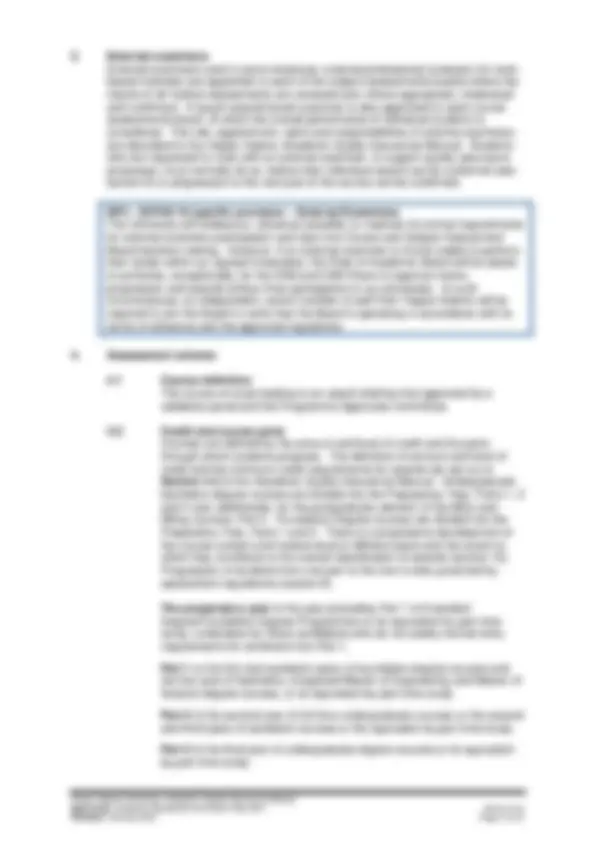
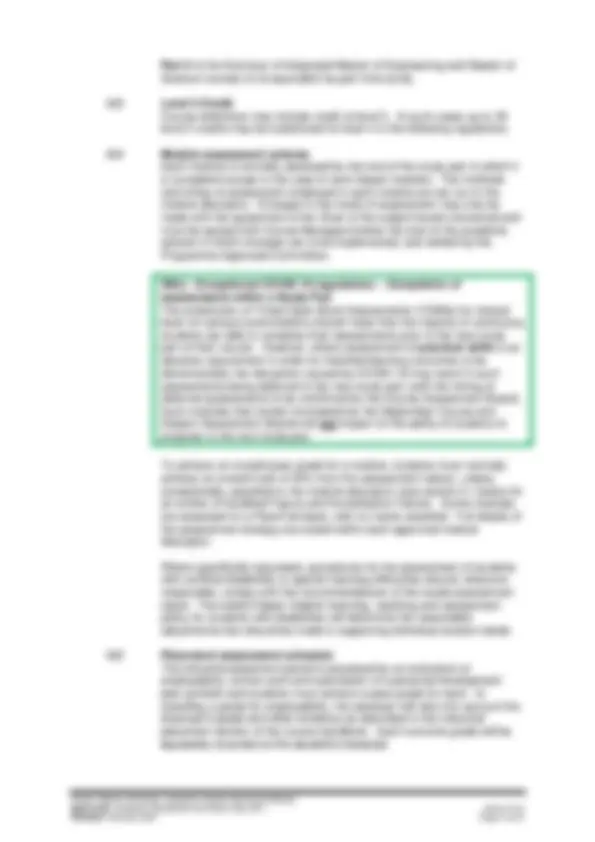
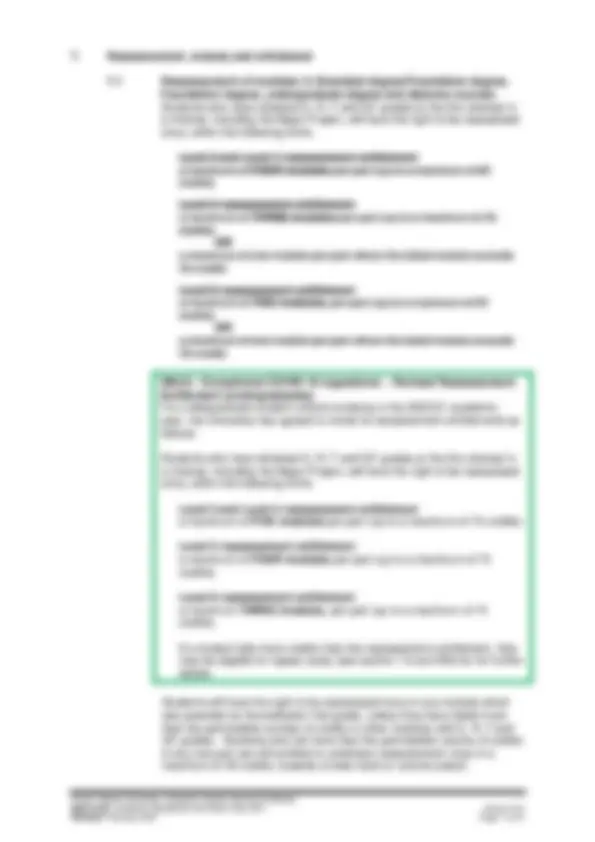
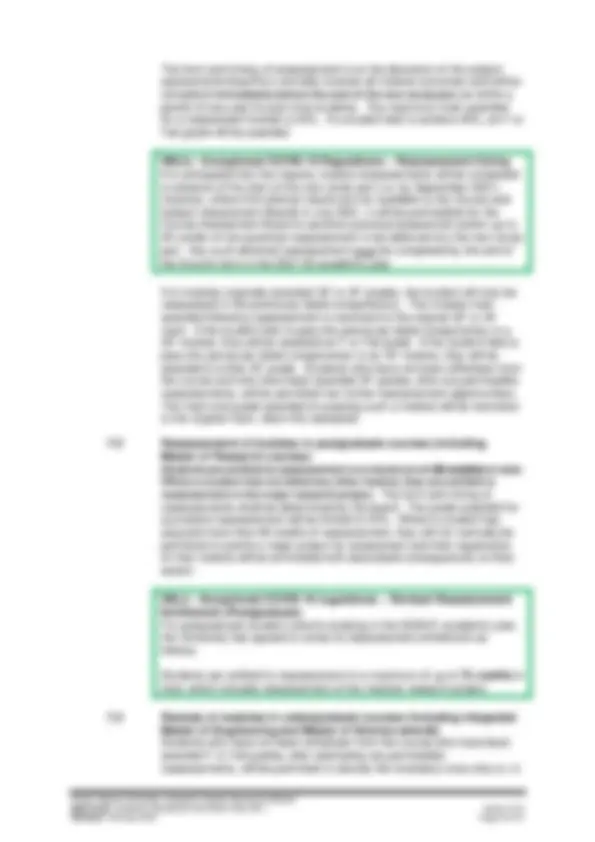
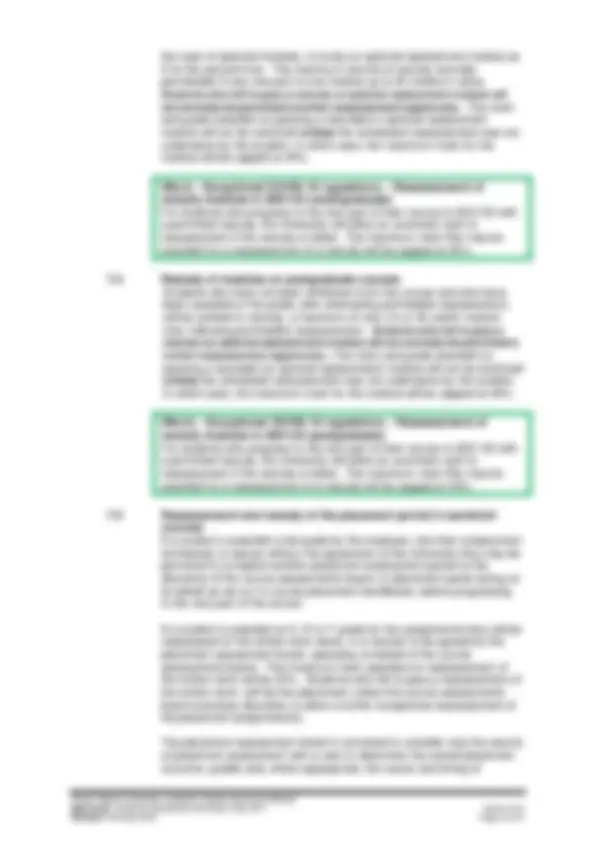
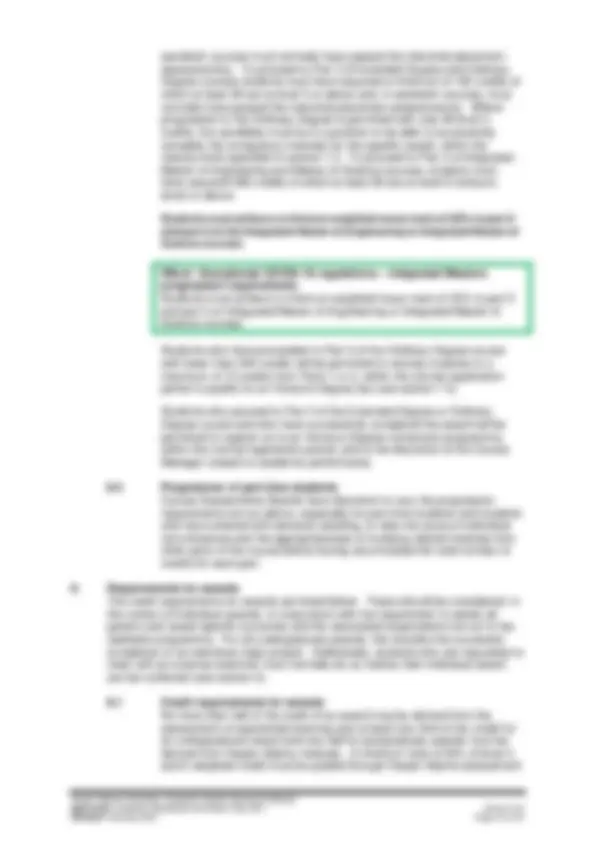
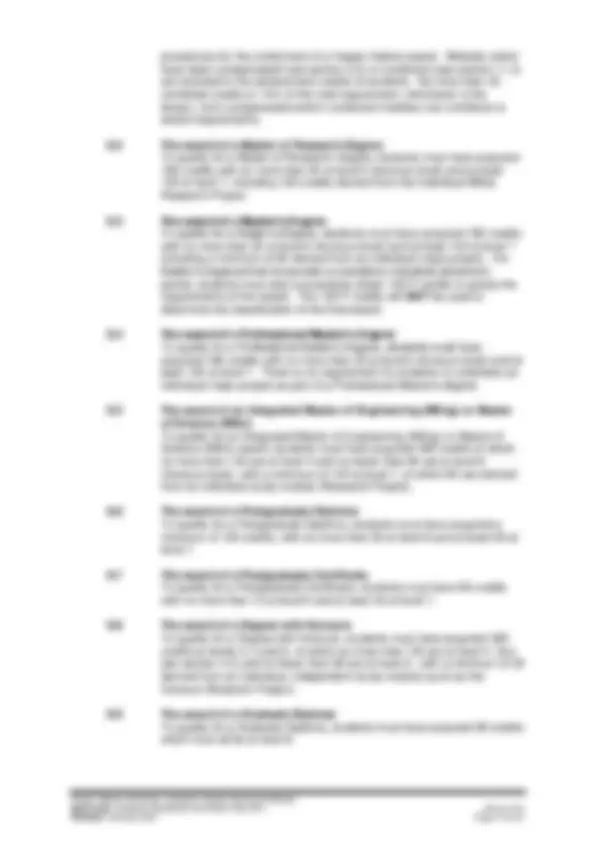
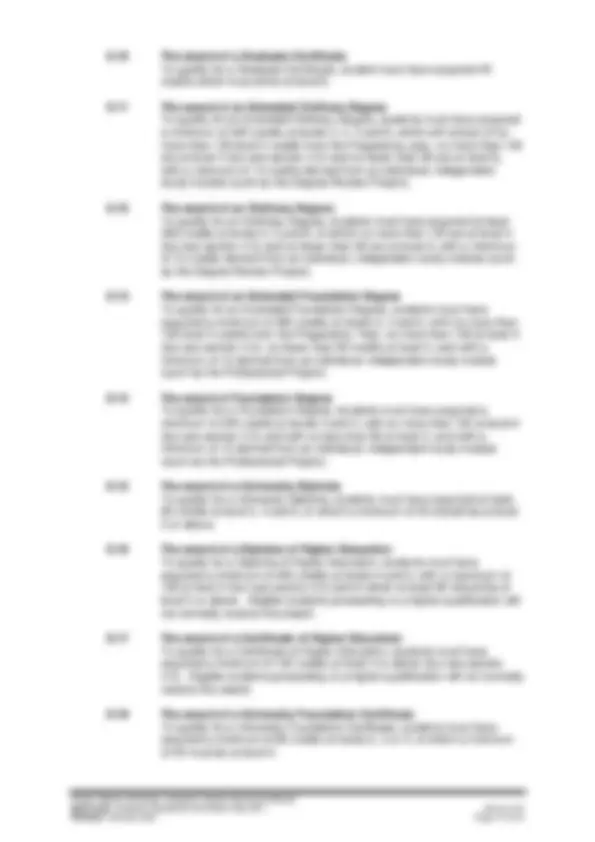
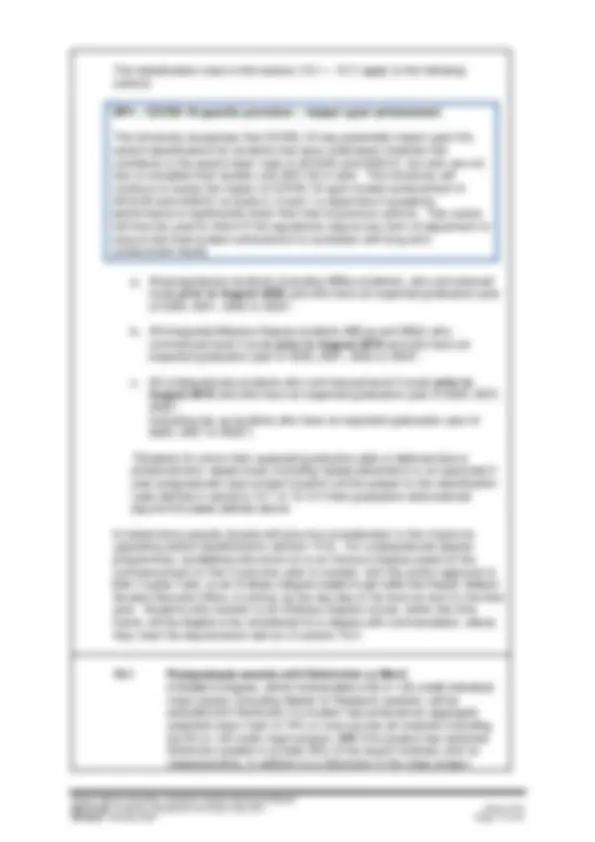
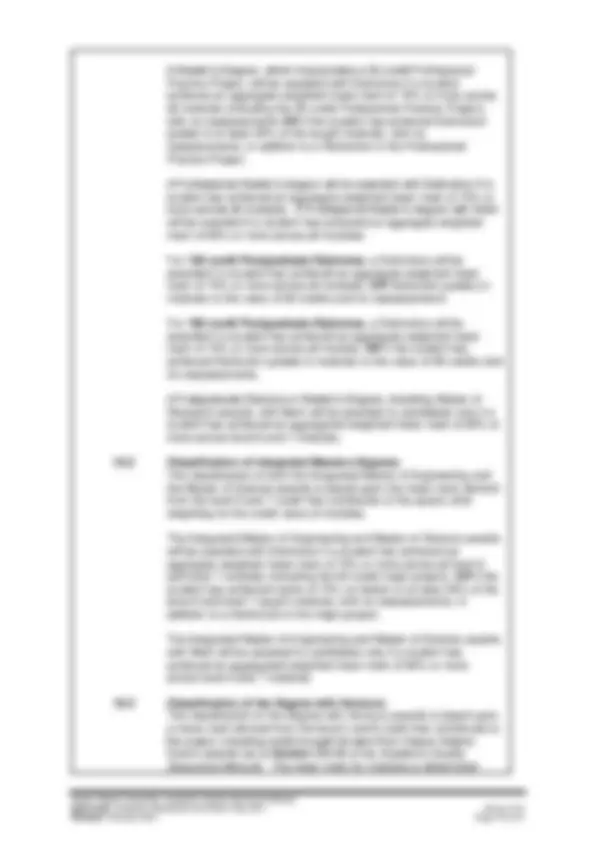
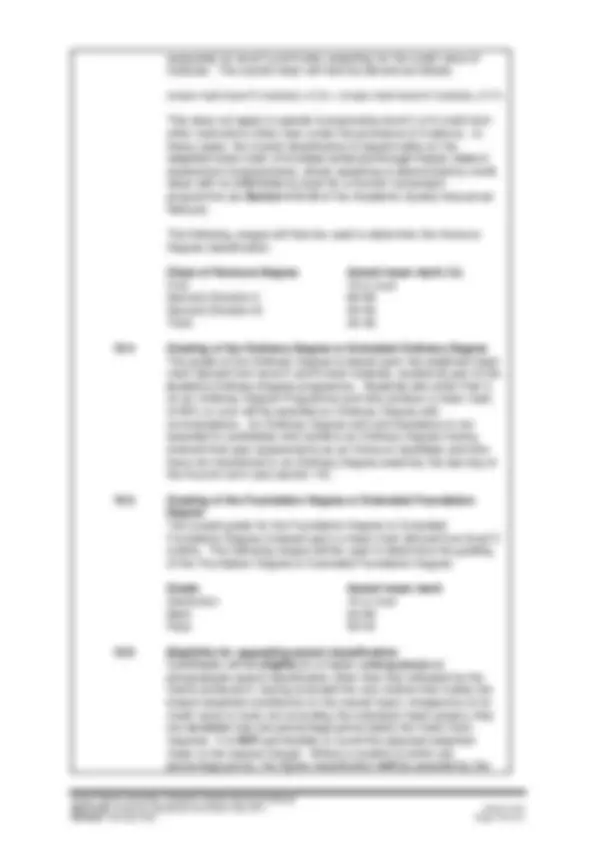
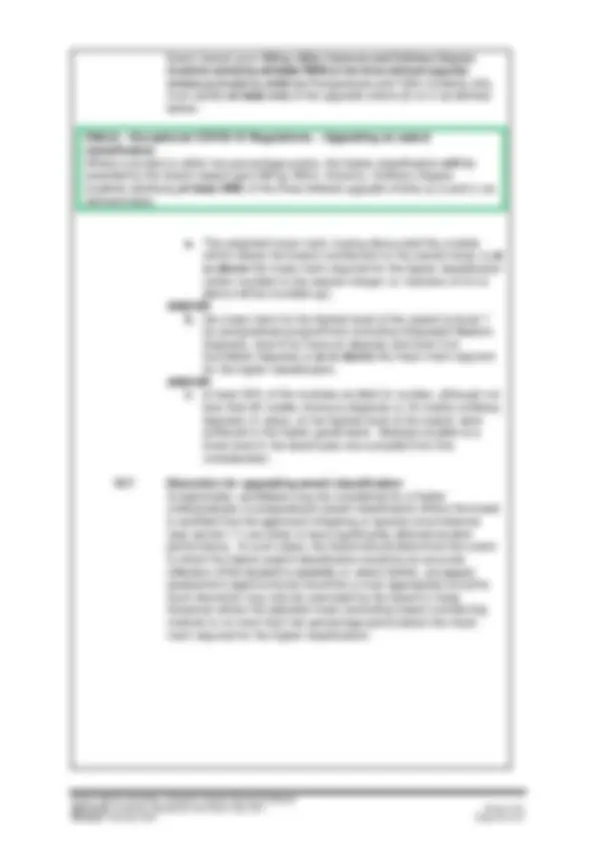
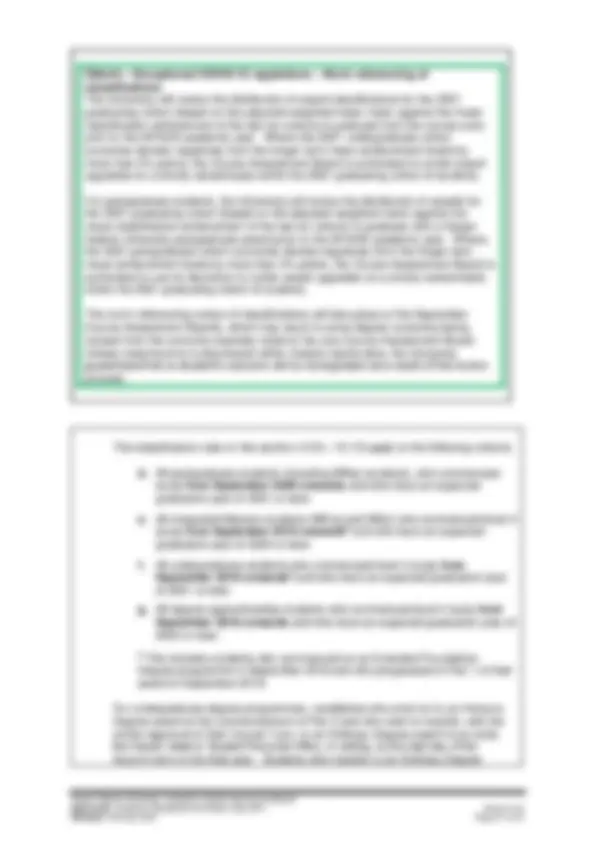
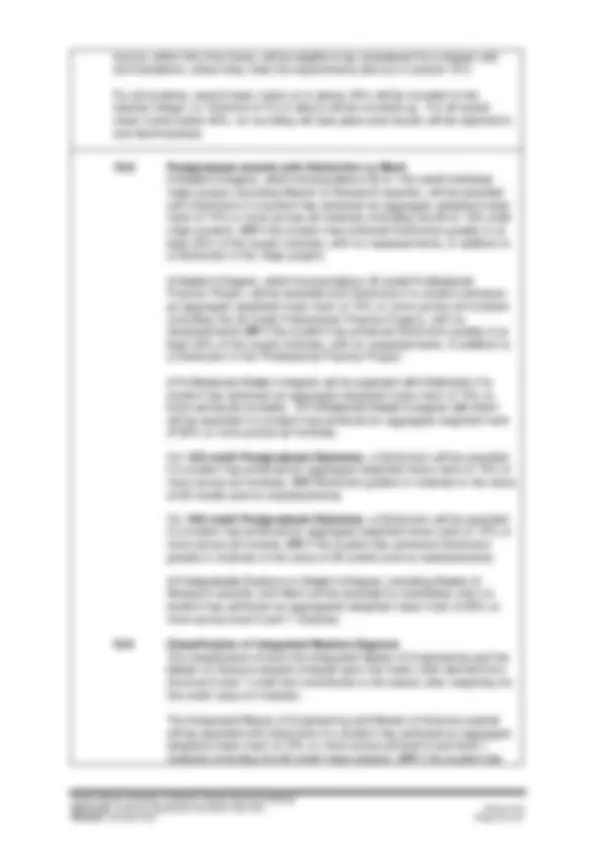
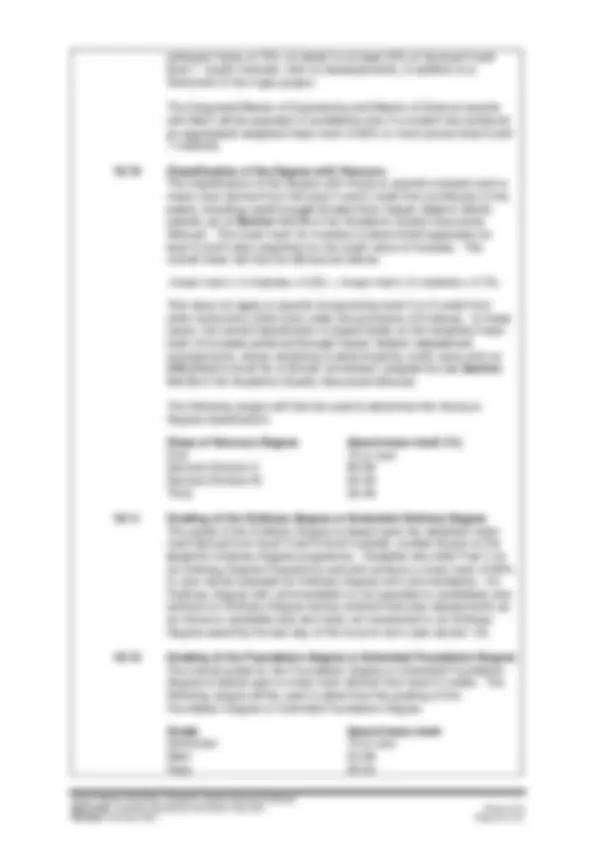
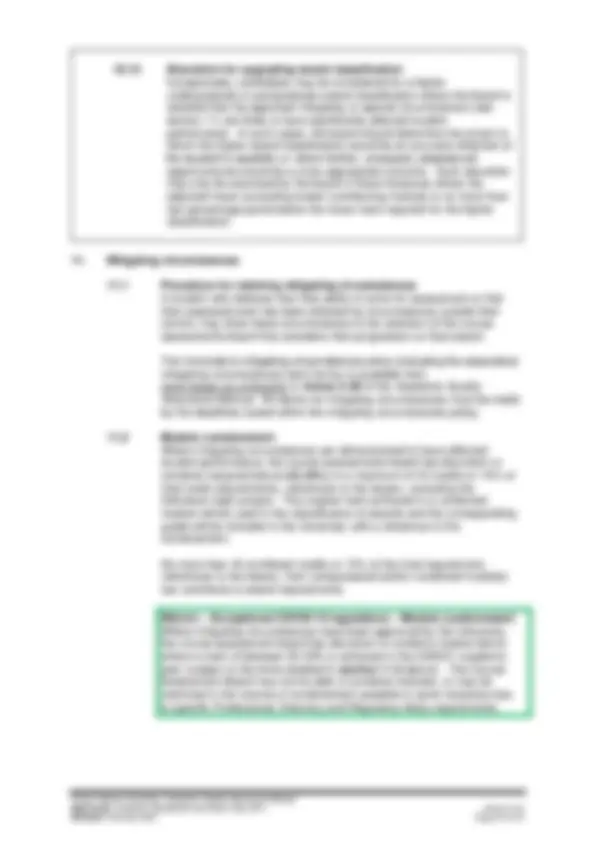
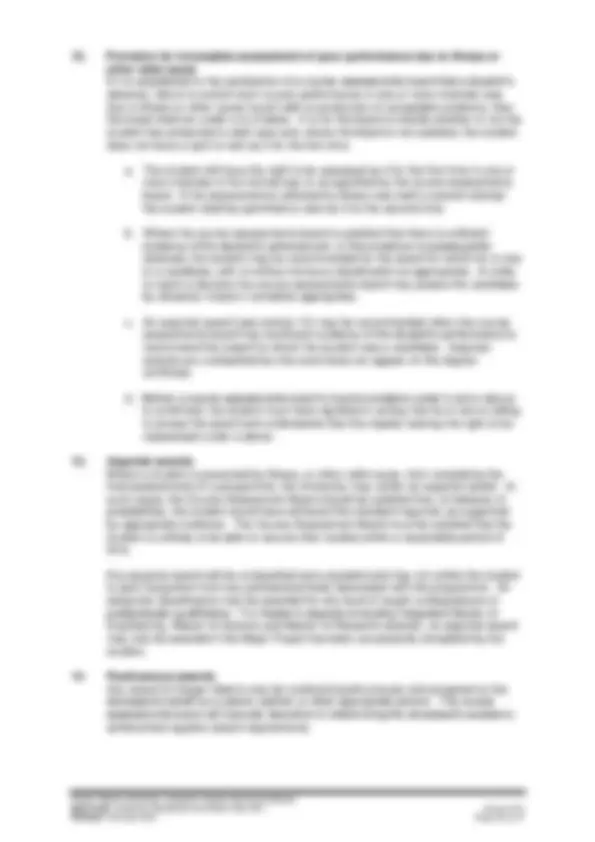
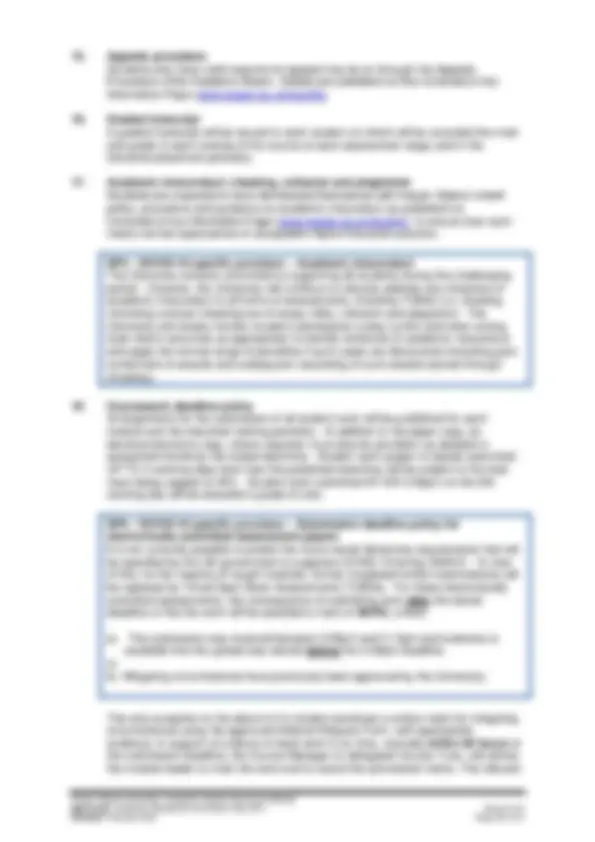
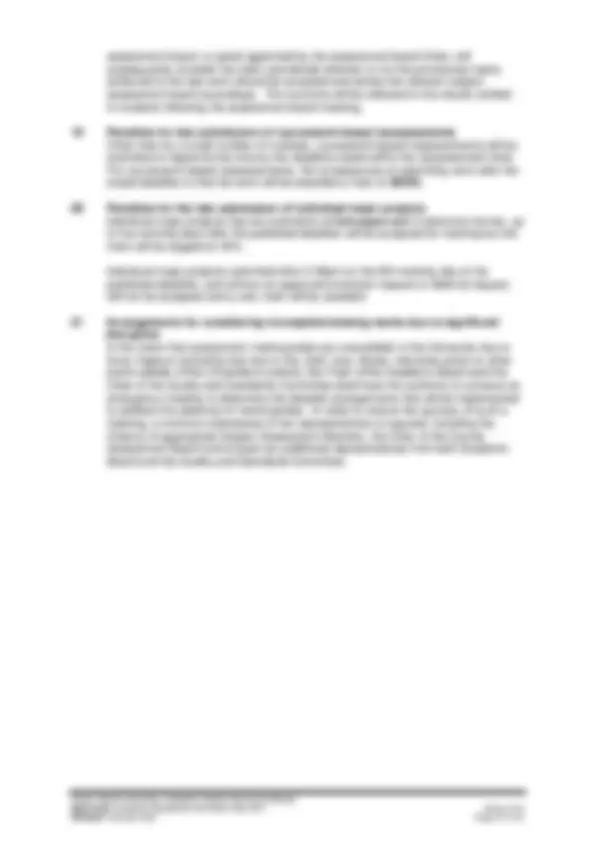


Study with the several resources on Docsity

Earn points by helping other students or get them with a premium plan


Prepare for your exams
Study with the several resources on Docsity

Earn points to download
Earn points by helping other students or get them with a premium plan
Community
Ask the community for help and clear up your study doubts
Discover the best universities in your country according to Docsity users
Free resources
Download our free guides on studying techniques, anxiety management strategies, and thesis advice from Docsity tutors
The grading, compensation, and progression requirements for various types of degrees at Harper Adams University. It covers module grading, compensation policies, and the number of credits required to progress to different parts of a degree. The document also includes information on honors degrees, graduate diplomas, and foundation degrees.
What you will learn
Typology: Schemes and Mind Maps
1 / 28

This page cannot be seen from the preview
Don't miss anything!





















Harper Adams University, Academic Quality Assurance Manual Approved: Academic Standards Committee, May 2011 Annex 5. Safety Net Assessment Scheme and Regulations for Taught and Master of Research Courses 2020/21 Academic Session COVID- 19 Pandemic: Specific Provisions within the 2020/ Assessment Regulations In light of the ongoing uncertainty caused by the COVID-19 pandemic, the University has incorporated a number of specific provisions within the 2020/21 assessment regulations. At this time, it is not possible to accurately predict the impact of the COVID-19 pandemic upon the 2020/21 academic year. Consequently, the University reserves the right to review and revise these regulations during the academic year if required. The University is committed to ensuring that its assessment regulations minimise disruption to student progression and degree outcomes, whilst also maintaining the academic standards and integrity of the University’s awards. The University recognises that the COVID-19 pandemic may impact also upon students beyond 2020/21 and these aspects will continue to be addressed in future versions of the University’s assessment regulations. For transparency, the specific provisions within the 2020/21 regulations that relate to COVID- 19 are detailed inside the blue text boxes within this document. COVID-19 Pandemic: Safety Net Provisions for 2020/ Although the 2020/21 assessment regulations incorporated a number of COVID specific provisions (as detailed within the blue text boxes within this document), the University has determined that a series of further revisions are appropriate to provide a ‘safety net’ for all students. The safety net regulations are intended to minimise disruption to student progression and degree outcomes, whilst also maintaining the academic standards and integrity of the University’s awards. The revised 20 20 /2 1 assessment regulations have received approval from the University’s Academic Board. For transparency, the safety net updates to the 20 20 /2 1 regulations that have been introduced are detailed inside the green text boxes within this document and elements of the original regulations which have been superseded have been struck-through.
Harper Adams University, Academic Quality Assurance Manual Approved: Academic Standards Committee, May 2011 Annex 5.
3. External examiners External examiners (and in some instances, external professional reviewers for work- based modules) are appointed to each of the subject assessments boards where the results of all module assessments are reviewed and, where appropriate, moderated and confirmed. A taught awards board examiner is also appointed to each course assessments board, at which the overall performance of individual students is considered. The role, appointment, rights and responsibilities of external examiners are described in the Harper Adams Academic Quality Assurance Manual. Students who are requested to meet with an external examiner, to support quality assurance processes, must normally do so, before their individual award can be conferred (see section 9) or progression to the next part of the course can be confirmed. SP2 - COVID-19 specific provision – External Examiners The University will endeavour, wherever possible, to maintain its normal requirements for external examiner participation and input into Course and Subject Assessment Board decision making. However, if an external examiner is ill and unable to perform their duties within our agreed timescales, the Chair of Academic Board will be asked to authorise, exceptionally, for the SAB and CAB Chairs to approve marks, progression and awards without their participation in our processes. In such circumstances, an independent, senior member of staff from Harper Adams will be required to join the Board to verify that the Board is operating in accordance with its terms of reference and the approved regulations. 4. Assessment scheme 4.1 Course definition The course of study leading to an award shall be that approved by a validation panel and the Programme Approvals Committee. 4.2 Credit and course parts Courses are defined by the amount and level of credit and the parts through which students progress. The definition of amount and level of credit and the minimum credit requirements for awards are set out in Section 4.4 of the Academic Quality Assurance Manual. Undergraduate bachelors degree courses are divided into the Preparatory Year, Parts 1, 2 and 3 and, additionally, for the postgraduate element of the MSci and MEng courses, Part 4. Foundation Degree courses are divided into the Preparatory Year, Parts 1 and 2. There is a progressive development of the course content and module level at different parts and the extent to which they contribute to the overall classification of awards (section 10). Progression of students from one part to the next is also governed by assessment regulations (section 8). The preparatory year is the year preceding Part 1 of Extended Degree/Foundation Degree Programmes or its equivalent by part-time study, undertaken by those candidates who do not satisfy normal entry requirements for enrolment into Part 1. Part 1 is the first and sandwich years of foundation degree courses and the first year of bachelors, Integrated Master of Engineering and Master of Science degree courses, or its equivalent by part-time study. Part 2 is the second year of full-time undergraduate courses or the second and third years of sandwich courses or the equivalent by part-time study. Part 3 is the final year of undergraduate degree courses or its equivalent by part-time study.
Harper Adams University, Academic Quality Assurance Manual Approved: Academic Standards Committee, May 2011 Annex 5. Part 4 is the final year of Integrated Master of Engineering and Master of Science courses or its equivalent by part-time study. 4.3 Level 3 Credit Course definitions may include credit at level 3. In such cases up to 30 level 3 credits may be substituted for level 4 in the following regulations. 4.4 Module assessment scheme Each module is normally assessed by the end of the study part in which it is completed except in the case of work-based modules. The methods and timing of assessment employed in each module are set out in the module descriptor. Changes to the mode of assessment may only be made with the agreement of the Chair of the subject board concerned and must be agreed with Course Managers before the start of the academic session in which changes are to be implemented, and ratified by the Programme Approvals Committee. SN(i) - Exceptional COVID-19 regulations – Completion of assessments within a Study Part The substitution of Timed Open-Book Assessments (TOBAs) for closed- book on-campus examinations should mean that the majority of continuing students are able to complete their assessments prior to the next study part of their course. However, where assessment of practical skills is an absolute requirement in order for intended learning outcomes to be demonstrated, the disruption caused by COVID-19 may result in such assessments being deferred to the next study part (with the timing of deferred assessments to be confirmed by the Course Assessment Board). Such modules that remain incomplete by the September Course and Subject Assessment Boards will not impact on the ability of students to progress to the next study part. To achieve an overall pass grade for a module, students must normally achieve an overall mark of 40% from the assessment task(s), unless, exceptionally, specified in the module descriptor (see section 5.1 below for an outline of Qualified Failure and Accreditation Failure). Some modules are assessed on a Pass/Fail basis, with no marks awarded. Full details of the assessment strategy are stated within each approved module descriptor. Where specifically requested, procedures for the assessment of students with certified disabilities or specific learning difficulties should, wherever reasonable, comply with the recommendations of the needs assessment report. The extant Harper Adams’ learning, teaching and assessment policy for students with disabilities will determine the reasonable adjustments that should be made in supporting individual student needs. 4.5 Placement assessment schedule The industrial placement period is assessed by an evaluation of employability, written work and submission of a personal development plan portfolio and students must achieve a pass grade for each. In awarding a grade for employability, the assessor will take into account the employer’s grade and other evidence as described in the industrial placement section of the course handbook. Each outcome grade will be separately recorded on the student’s transcript.
Harper Adams University, Academic Quality Assurance Manual Approved: Academic Standards Committee, May 2011 Annex 5. SN(ii) - Exceptional COVID-19 Regulations – Compensation For all students, the course assessments boards have discretion to compensate a failed module (between 30-39%) in a maximum of any one module per part, being assessed for the first time with a credit value of no more than 20. Compensation will only be considered if the student has obtained an overall mean mark of at least 45% and has failed no more than 40 credits in that study part and if, in the opinion of the board, the student has achieved all of the outcomes of the award at that stage, especially if the marginal fail is in a core module (see section 10.5). The Course Assessment Board may not be able to compensate modules, or may be restricted in the volume of compensation possible in some instances due to specific Professional, Statutory and Regulatory Body requirements. For all students, the course assessments boards have discretion to compensate a marginal failure (between 35-39%) in a maximum of any one module per part, being assessed for the first time with a credit value of no more than 20. Compensation will only be considered if the student has obtained an overall mean mark of at least 50% and has failed no more than 40 credits in that study part and if, in the opinion of the board, the student has achieved all of the outcomes of the award at that stage, especially if the marginal fail is in a core module (see section 10.5). The original mark achieved in compensated modules will be used in the classification of awards and the corresponding grade (E, R and F) will be included in the transcript, with a reference to the compensation. No more than 45 combined credits or 15% of the total requirement, (whichever is the lesser), from compensated and/or condoned modules can contribute to award requirements.
6. Equivalence of grades and credits delivered in institutions outside the UK The equivalence of credit value of modules studied in countries outside the UK is based upon the approach adopted in the European Course Credit Transfer System (ECTS) in which credits are awarded by proportion of year of study rather than for study hours. Each year of study on a standard degree in each institution will thus carry 60 ECTS or 120 UK credits. The number of credits awarded per module will therefore depend on the proportion of the year represented by each module. The equivalence of grades derived from degree modules delivered in partner institutions will be determined by aligning marking and assessment criteria within the ECTS system. Whilst it shall be normal practice to accept the module grades determined by overseas institutions, with which there are approved student exchange arrangements), in determining award classification, course assessments boards shall in all cases consider whether the results achieved in overseas study are significantly different from those achieved in the rest of the programme and use discretion in determining the class agreed because of individual experience of the student (see section 10.6).
Harper Adams University, Academic Quality Assurance Manual Approved: Academic Standards Committee, May 2011 Annex 5.
7. Reassessment, restudy and withdrawal 7.1 Reassessment of modules in Extended degree/Foundation degree, Foundation degree, undergraduate degree and diploma courses Students who have obtained E, R, F and QF grades at the first attempt in a module, including the Major Project, will have the right to be reassessed once, within the following limits: Level 3 and Level 4 reassessment entitlement a maximum of FOUR modules per part (up to a maximum of 60 credits) Level 5 reassessment entitlement a maximum of THREE modules per part (up to a maximum of 45 credits) OR a maximum of one module per part where the failed module exceeds 45 credits Level 6 reassessment entitlement a maximum of TWO modules , per part (up to a maximum of 60 credits) OR a maximum of one module per part where the failed module exceeds 40 credits SN(iii) - Exceptional COVID-19 regulations – Revised Reassessment Entitlement (undergraduates) For undergraduate student cohorts studying in the 2020/21 academic year, the University has agreed to revise its reassessment entitlements as follows: Students who have obtained E, R, F and QF grades at the first attempt in a module, including the Major Project, will have the right to be reassessed once, within the following limits: Level 3 and Level 4 reassessment entitlement a maximum of FIVE modules per part (up to a maximum of 75 credits) Level 5 reassessment entitlement a maximum of FOUR modules per part (up to a maximum of 75 credits) Level 6 reassessment entitlement a maximum THREE modules , per part (up to a maximum of 75 credits) If a student fails more credits than the reassessment entitlement, they may be eligible for repeat study (see section 7.6 and SN(viii) for further details. Students will have the right to be reassessed once in any module which was awarded an Accreditation Fail grade, unless they have failed more than the permissible number of credits in other modules with E, R, F and QF grades. Students who fail more than the permissible volume of credits in any one part are still entitled to undertake reassessment once in a maximum of 40 credits, towards a lower level or volume award.
Harper Adams University, Academic Quality Assurance Manual Approved: Academic Standards Committee, May 2011 Annex 5. the case of optional modules, to study an optional replacement module as if for the second time. The maximum volume of restudy normally permissible in any one part is one module up to 20 credits in value. Students who fail to pass a restudy or optional replacement module will not normally be permitted a further reassessment opportunity. The mark and grade awarded on passing a restudied or optional replacement module will not be restricted unless the scheduled reassessment was not undertaken by the student, in which case, the maximum mark for the module will be capped at 40%. SN(vi) - Exceptional COVID-19 regulations – Reassessment of restudy modules in 2021/22 (undergraduate) For students who progress to the next part of their course in 2021/22 with a permitted restudy, the University will allow an automatic right to reassessment if the restudy is failed. The maximum mark that may be awarded for a reassessment of a restudy will be capped at 40%. 7.4 Restudy of modules on postgraduate courses Students who have not been withdrawn from the course and who have been awarded a Fail grade, after attempting permissible reassessment, will be entitled to restudy. a maximum of one (15 or 30 credit) module only, following permissible reassessment. Students who fail to pass a restudy (or optional replacement) module will not normally be permitted a further reassessment opportunity. The mark and grade awarded on passing a restudied (or optional replacement) module will not be restricted unless the scheduled reassessment was not undertaken by the student, in which case, the maximum mark for the module will be capped at 40%. SN(vii) - Exceptional COVID-19 regulations – Reassessment of restudy modules in 2021/22 (postgraduate) For students who progress to the next part of their course in 2021/22 with a permitted restudy, the University will allow an automatic right to reassessment if the restudy is failed. The maximum mark that may be awarded for a reassessment of a restudy will be capped at 40%. 7.5 Reassessment and restudy of the placement period in sandwich courses If a student is awarded a fail grade by the employer, has their employment terminated, or leaves without the agreement of the University they may be permitted to complete another placement employment period at the discretion of the course assessments board, or placement panel acting on its behalf as set out in course placement handbooks, before progressing to the next part of the course. If a student is awarded an E, R or F grade for the assignments they will be reassessed on the written work alone, in a manner to be agreed by the placement assessment board, operating on behalf of the course assessments board. The maximum mark awarded on reassessment of the written work will be 40%. Students who fail to pass a reassessment of the written work, will fail the placement unless the course assessments board exercises discretion to allow a further exceptional reassessment of the placement assignment(s). The placement assessment board is convened to consider only the results of placement assessment with a view to determine the overall placement outcome, grades and, where appropriate, the nature and timing of
Harper Adams University, Academic Quality Assurance Manual Approved: Academic Standards Committee, May 2011 Annex 5. reassessments. Its membership comprises the course assessments board Chair who chairs the meeting, Exams Office Manager, Placement Manager, Course Manager and Course Tutor(s). 7.6 Withdrawal from a course and repeat study for undergraduate courses (including Integrated Master of Engineering and Master of Science awards) Students who fail to satisfy the requirements for progression or for the award will normally be withdrawn unless the course assessments board exercises discretion to allow a repeat of all or part of the year. This discretion to repeat study will only be allowed if the student concerned has: SN(viii) Exceptional COVID-19 regulations – revised repeat study criteria (undergraduate) For undergraduate students studying in the 2020/21 academic year, the University has revised the following element of its repeat study criteria: (i) obtained a mean mark of over 35% for that part of the course after permitted reassessment, and (i) obtained a mean mark of over 40% for that part of the course after permitted reassessment, and (ii) obtained credits that are no more than 45 short of the requirement to proceed to the next part of their registered programme. Students who elect to repeat study will not be eligible to register, concurrently, for other taught or sandwich elements of their programme, until they have passed all their outstanding modules. There is no entitlement to repeat study for students who fail more than 60 credits in a part and such students will normally be withdrawn from the course unless there are approved mitigating circumstances. 7.7 Withdrawal from a course and repeat study for postgraduate courses (excluding Master of Research courses) Students who fail to satisfy the requirements for their intended award will normally be withdrawn unless the course assessments board exercises discretion to allow a repeat all or some of the failed modules. This discretion to repeat study will only be allowed if the student concerned has: SN(ix) Exceptional COVID-19 regulations – revised repeat study criteria (postgraduate) For postgraduate students studying in the 2020/21 academic year, the University has revised the following element of its repeat study criteria (i) obtained a mean mark of over 35% for that part of the course after permitted reassessment, and (ii) obtained a mean mark of over 40% in the taught components of the course after permitted reassessment, and (iii) successfully passed at least 50% of their taught modules that they have studied within the current academic year.
Harper Adams University, Academic Quality Assurance Manual Approved: Academic Standards Committee, May 2011 Annex 5. sandwich courses must normally have passed the industrial placement assessment(s). To proceed to Part 3 of Extended Degree and Ordinary Degree courses students must have acquired a minimum of 195 credits of which at least 90 are at level 5 or above and, in sandwich courses, must normally have passed the industrial placement assessment(s). Where progression to the Ordinary Degree is permitted with only 90 level 5 credits, the candidate must be in a position to be able to successfully complete the compulsory modules for the specific award, within the restudy limits specified in section 7.3. To proceed to Part 4 of Integrated Master of Engineering and Master of Science courses, students must have acquired 360 credits of which at least 90 are at level 6 (honours level) or above. Students must achieve a minimum weighted mean mark of 60% in part 2 and part 3 of the Integrated Master of Engineering or Integrated Master of Science courses. SN(xi) Exceptional COVID-19 regulations – Integrated Masters progression requirements Students must achieve a minimum weighted mean mark of 55% in part 2 and part 3 of Integrated Master of Engineering or Integrated Master of Science courses. Students who have proceeded to Part 3 of the Ordinary Degree course with fewer than 240 credits will be permitted to restudy modules to a maximum of 15 credits from Parts 1 or 2, within the normal registration period to qualify for an Honours Degree (but see section 7.3). Students who proceed to Part 3 of the Extended Degree or Ordinary Degree course and who have successfully completed the award will be permitted to register on to an Honours Degree conversion programme, within the normal registration period, and at the discretion of the Course Manager, based on academic performance. 8.4 Progression of part-time students Course Assessments Boards have discretion to vary the progression requirements set out above, especially for part-time students and students who have entered with advance standing, to take into account individual circumstances and the appropriateness of studying related modules from other parts of the course before having accumulated the total number of credits for each part.
9. Requirements for awards The credit requirements for awards are listed below. These should be considered, in the context of individual awards, in conjunction with the requirement to satisfy all generic and award specific outcomes and the associated expectations set out in the validation programme. For all undergraduate awards, this includes the successful completion of an individual major project. Additionally, students who are requested to meet with an external examiner must normally do so, before their individual award can be conferred (see section 3). 9.1 Credit requirements for awards No more than half of the credit of an award may be derived from the assessment of experiential learning and at least one third of the credit for an undergraduate award and one half for postgraduate awards must be derived from Harper Adams modules. A minimum total of 50% of level 5 and 6 weighted credit must be graded through Harper Adams assessment
Harper Adams University, Academic Quality Assurance Manual Approved: Academic Standards Committee, May 2011 Annex 5. procedures for the conferment of a Harper Adams award. Modules which have been compensated (see section 5.2) or condoned (see section 11.3) are included in the achievement credits of students. No more than 45 combined credits or 15% of the total requirement, (whichever is the lesser), from compensated and/or condoned modules can contribute to award requirements. 9.2 The award of a Master of Research Degree To qualify for a Master of Research Degree, students must have acquired 180 credits with no more than 30 at level 6 (honours level) and at least 150 at level 7, including 120 credits derived from the individual MRes Research Project. 9.3 The award of a Master’s Degree To qualify for a Master’s Degree, students must have acquired 180 credits with no more than 30 at level 6 (honours level) and at least 150 at level 7 including a minimum of 60 derived from an individual major project. For Master’s degrees that incorporate a mandatory industrial placement period, students must also successfully obtain 120 P credits to satisfy the requirements of the award. The 120 P credits will NOT be used to determine the classification of the final award. 9.4 The award of a Professional Master’s Degree To qualify for a Professional Master’s Degree, students must have acquired 180 credits with no more than 30 at level 6 (honours level) and at least 150 at level 7. There is no requirement for students to undertake an individual major project as part of a Professional Master’s degree. 9.5 The award of an Integrated Master of Engineering (MEng) or Master of Science (MSci) To qualify for an Integrated Master of Engineering (MEng) or Master of Science (MSci) award, students must have acquired 480 credits of which no more than 135 are at level 4 and no fewer than 90 are at level 6 (honours level), with a minimum of 120 at level 7, of which 60 are derived from an individual study module (Research Project). 9.6 The award of a Postgraduate Diploma To qualify for a Postgraduate Diploma, students must have acquired a minimum of 120 credits, with no more than 30 at level 6 and at least 90 at level 7. 9.7 The award of a Postgraduate Certificate To qualify for a Postgraduate Certificate, students must have 60 credits with no more than 15 at level 6 and at least 45 at level 7. 9.8 The award of a Degree with Honours To qualify for a Degree with Honours, students must have acquired 360 credits at levels 4, 5 and 6, of which no more than 135 are at level 4 (but see section 4.3) and no fewer than 90 are at level 6 , with a minimum of 30 derived from an individual, independent study module (such as the Honours Research Project). 9.9 The award of a Graduate Diploma To qualify for a Graduate Diploma, students must have acquired 80 credits which must all be at level 6.
Harper Adams University, Academic Quality Assurance Manual Approved: Academic Standards Committee, May 2011 Annex 5. 9.19 The award of sandwich qualifications The assessment of the industrial placement period(s) does not contribute to the class or grade of a degree award. However, this (these) period(s) is (are) regarded as an integral part of the course and 120 P credits must be obtained before a sandwich award can be made. A minimum period of 44 weeks of approved placement employment, or longer where specified in the programme specification, must normally be completed for students to be considered for a sandwich award. SP3 - COVID-19 specific provision – Industrial Placement Requirements For students who undertake an industrial placement period during the 2020/21 academic session, the Industrial Placement Board/Course Assessment Board is permitted to exercise discretion in relation to the minimum duration that is required for satisfactory completion of a placement. Discretion may be applied in instances where placements which ended before the normal minimum period of employment was completed (see section 9. above), is sanctioned by both the employer and the University.
Harper Adams University, Academic Quality Assurance Manual Approved: Academic Standards Committee, May 2011 Annex 5.
Harper Adams University, Academic Quality Assurance Manual Approved: Academic Standards Committee, May 2011 Annex 5. A Master’s Degree, which incorporates a 30 credit Professional Practice Project, will be awarded with Distinction if a student achieves an aggregate weighted mean mark of 70% or more across all modules (including the 30 credit Professional Practice Project), with no reassessments OR if the student has achieved Distinction grades in at least 50% of the taught modules, with no reassessments, in addition to a Distinction in the Professional Practice Project. A Professional Master’s degree will be awarded with Distinction if a student has achieved an aggregate weighted mean mark of 70% or more across all modules. A Professional Master’s degree with Merit will be awarded if a student has achieved an aggregate weighted mark of 60% or more across all modules. For 120 credit Postgraduate Diplomas , a Distinction will be awarded if a student has achieved an aggregate weighted mean mark of 70% or more across all modules, OR Distinction grades in modules to the value of 60 credits and no reassessments. For 180 credit Postgraduate Diplomas , a Distinction will be awarded if a student has achieved an aggregate weighted mean mark of 70% or more across all module, OR if the student has achieved Distinction grades in modules to the value of 90 credits and no reassessments. A Postgraduate Diploma or Master’s Degree, including Master of Research awards, with Merit will be awarded to candidates only if a student has achieved an aggregated weighted mean mark of 60% or more across level 6 and 7 modules. 10.2 Classification of Integrated Masters Degrees The classification of both the Integrated Master of Engineering and the Master of Science awards is based upon the mean mark derived from the level 6 and 7 credit that contributes to the award, after weighting for the credit value of modules. The Integrated Master of Engineering and Master of Science awards will be awarded with Distinction if a student has achieved an aggregate weighted mean mark of 70% or more across all level 6 and level 7 modules (including the 60 credit major project), OR if the student has achieved marks of 70% (or better) in at least 50% of the level 6 and level 7 taught modules, with no reassessments, in addition to a Distinction in the major project. The Integrated Master of Engineering and Master of Science awards with Merit will be awarded to candidates only if a student has achieved an aggregated weighted mean mark of 60% or more across level 6 and 7 modules. 10.3 Classification of the Degree with Honours The classification of the Degree with Honours awards is based upon a mean mark derived from the level 5 and 6 credit that contributes to the award, including credit brought forward from Harper Adams’ interim awards (as at Section 4.5.12 of the Academic Quality Assurance Manual ). The mean mark for modules is determined
Harper Adams University, Academic Quality Assurance Manual Approved: Academic Standards Committee, May 2011 Annex 5. separately for level 5 and 6 after weighting for the credit value of modules. The overall mean will then be derived as follows: (mean mark level 5 modules x 0.3) + (mean mark level 6 modules x 0.7). This does not apply to awards incorporating level 5 or 6 credit from other institutions (other than under the provisions of 6 above). In these cases, the overall classification is based solely on the weighted mean mark of modules achieved through Harper Adams’ assessment arrangements, where weighting is determined by credit value with no differential by level for a normal ‘conversion’ programme (as Section 4.5.12 of the Academic Quality Assurance Manual ). The following ranges will then be used to determine the Honours Degree classification: Class of Honours Degree Award mean mark (%) First 70 or over Second (Division I) 60 - 69 Second (Division II) 50 - 59 Third 40 - 49 10.4 Grading of the Ordinary Degree or Extended Ordinary Degree The grade of the Ordinary Degree is based upon the weighted mean mark derived from level 5 and 6 level modules, studied as part of the student’s Ordinary Degree programme. Students who enter Part 3 on an Ordinary Degree Programme and who achieve a mean mark of 60% or over will be awarded an Ordinary Degree with commendation. An Ordinary Degree with commendation is not awarded to candidates who achieve an Ordinary Degree having entered final year assessments as an Honours candidate and who have not transferred to an Ordinary Degree award by the last day of the Autumn term (see section 10). 10 .5 Grading of the Foundation Degree or Extended Foundation Degree The overall grade for the Foundation Degree or Extended Foundation Degree is based upon a mean mark derived from level 5 credits. The following ranges will be used to determine the grading of the Foundation Degree or Extended Foundation Degree: Grade Award mean mark Distinction 70 or over Merit 55 - 69 Pass 40 - 54 10.6 Eligibility for upgrading award classification Candidates will be eligible for a higher undergraduate or postgraduate award classification other than that indicated by the marks achieved if, having excluded the one module that makes the lowest weighted contribution to the overall mean, irrespective of its credit value or level, but excluding the individual major project, they are no more than two percentage points below the mean mark required. It is NOT permissible to round this adjusted weighted mean to the nearest integer. Where a student is within two percentage points, the higher classification will be awarded by the